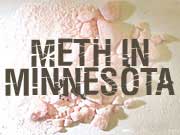Counties want help battling meth
February 3, 2004
 |
| Methamphetamine can be made relatively easily, with a variety of household chemicals. Officials say there are hundreds of active meth labs in Minnesota, but most of the meth sold here is imported from Mexico. (Photo by Payin2Much, copyright 2002 Erowid.org ) |
Moorhead, Minn. — Methamphetamine labs leave behind a toxic mess of chemicals. Meth production includes ingredients like drain cleaner, lye, acetone and lithium batteries. The resulting toxic waste is usually a small amount, but cleanup can cost thousands of dollars.
More than 75 counties are considering or have passed ordinances to recoup the cost. The county ordinances set up rules for cleaning up meth labs, but the cost is assessed to the property owner.
 | |||
Ottertail County Attorney David Hauser says many meth labs are set up in rental property or farm fields, without the knowledge of the property owner.
"So it's very possible you have an innocent landowner now who has a toxic waste site on his property, and he is responsible to clean that up," says Hauser.
In many counties, the cost of cleaning up a meth lab will be added to property taxes, much like a special assessment for new sidewalks or sewers. County officials say meth lab cleanup represents only a small part of the bill for a growing meth problem.
Ottertail County Sheriff Brian Schlueter says he doesn't have enough officers to handle all the meth cases in the county. The sheriff says meth addiction leads to more burglaries, thefts and check forgeries. Meth addicts who are arrested need psychological and medical care while they are in jail.
"In my 30 years experience, I've seen the waves of PCP and cocaine and on and on. And it will cycle out eventually. But I think this is going to cut a pretty big swath of damage and tragedy," says Schlueter.
 | |||
Schlueter wants state officials to take the meth problem more seriously.
"I think it's disappointing from a state of Minnesota standpoint, as far as money dedicated to the problem," says Schlueter. "Quite frankly, I think North Dakota has taken a more serious look at trying to deal with the problem than Minnesota has. There's very little state money toward any drug enforcement."
The North Dakota attorney general's office says the state allocates $1.5 million a year for drug enforcement, in addition to $1.7 million in federal funds. Minnesota uses no state money, but relies instead on $2.6 million in federal funding.
Debra Durkin at the Minnesota Health Department says Minnesota counties are losing the battle against meth. Durkin has been visiting rural counties for several months, to talk about meth cleanup ordinances and other issues related to meth use.
"Many Minnesota counties are just being swamped by the cost of meth, and are getting into task forces and a local meth response because they've got to do something," says Durkin.
 | |||
But Durkin says the local response is limited by a lack of funding.
"For example, one county told me they know of 30 meth labs. But every single lab seizure may take the time of everyone in the sheriff's office, all seven of them, six to 10 days of staff time," says Durkin. "They're not allowed overtime, so they have to put those labs on a list and pluck them off one at a time -- when they can afford to do it."
Durkin says meth is becoming more available to young people across the state. The question she hears most as she travels to towns and counties is, "When will there be a meth education program in Minnesota schools?"
It's not likely to happen soon.
Sen. Julie Rosen, R-Fairmont, is sponsoring methamphetamine legislation. Her proposal would allow police to arrest someone who has in their possession all the ingredients for making meth. The bill would also put restrictions on the sale of a key ingredient, ephedrine.
Sen. Rosen also proposes a revolving loan fund to help counties with meth lab cleanup. Assessments against property owners where meth labs are found would be used to repay the loans.
|
I think it's disappointing ... as far as money dedicated to the problem. Quite frankly, I think North Dakota has taken a more serious look at trying to deal with the problem than Minnesota has.
- Ottertail County Sheriff Brian Schlueter |
Rosen says she understands the need for public education about meth, but she was told meth education would be too expensive and would never pass the Legislature.
"That's the portion of this bill that is lacking, the public awareness portion. There would be a tremendous fiscal note on that," says Rosen. "I wish we could do that, and perhaps next year we can or the year after."
Local law enforcement officials and public health workers says if meth use isn't curtailed, the social costs will spiral quickly upward.
More addicts will need psychological and medical care, children of meth addicts will need foster care, and babies born to addicted mothers may have serious learning disabilities.
The Health Department's Debra Durkin says Minnesota still has a chance to learn from the mistakes of states that dealt with meth much earlier. "We've got a lot more information, a lot more science to help us build a better response," says Durkin.
But a better response will mean spending more money.
"Given the reduction in staff that many of our counties have had, they will not be able to do this without additional help," says Durkin.
County officials say considering the state budget picture, they're not expecting much help battling meth in the near future.
|
News Headlines
|
Related Subjects
|

